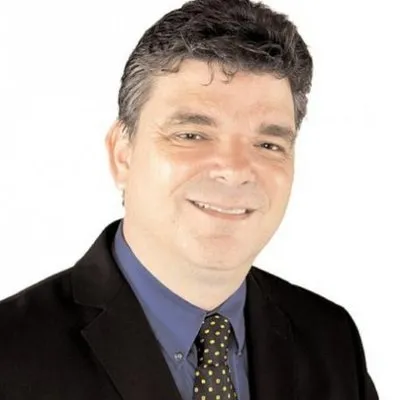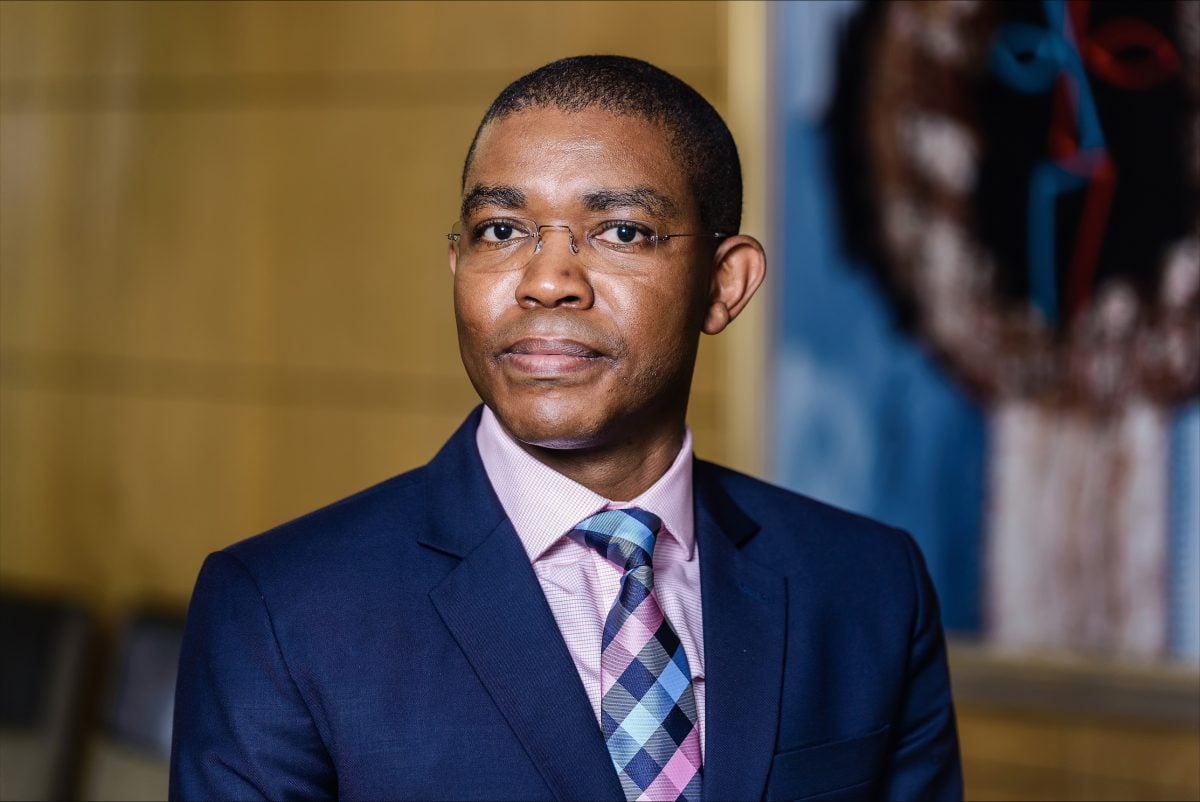Themba Baloyi is an entrepreneur and investor who hits the ground running – every day, rain or shine. On this cool morning in Johannesburg, fresh from pounding the roads for 10 kilometres for the 2,663rd day in a row, Baloyi sits down with African Business for a chat. His fanatical commitment to running – he will soon push up to 16 km a day in preparation for the Pietermaritzburg to Durban Comrades Marathon – mirrors the determination that brought him success.
His idea, which he had to push for years like a boulder uphill, was the creation of South Africa-based Discovery Insure – a sister company to health insurance giant Discovery Health.
Discovery Insure offers car and house insurance. It came up with packages which rewarded good driving, provided roadside maintenance and charged no excess for an accident caused by a third party. Call centres were established to sell policies to the public, many of whom were first-time insurance buyers.
Creating the business from inside insurance giant Discovery Limited took seven rejections and 15 years of hard slog as gruelling as a marathon. Now established with 1.9m members as of February this year, it is targeting expansion into the competitive, yet lucrative, UK insurance market.
Baloyi’s chance
Discovery’s diversification began with a meeting in 2003 between Baloyi and Discovery founder and chief executive Adrian Gore, who he’d been working for since 2001. “I was really moved by his beautiful speech about the future of the country and the opportunities that lay ahead. I thought he was very authentic… I said to him it was a great speech, and it made me all the keener to pursue my vision. Of course I was naïve! Here I was talking to the group CEO hardly three years into the business, and I am telling him I want to pursue my vision,” recalls Baloyi with a smile.
“Then he wanted to know: what is the vision… the point is [Gore said]: you must have a compelling vision that you believe in; it should not matter what time of the night someone wakes you – you should be able to articulate that vision.”
“In 2006, September, I met Adrian, told him about the vision and immediately after that meeting I got a call that he was in the US and I was told to abandon the idea… That, I will never forget, was a defining moment for me.”
Bitterly disappointed, Baloyi refused to ditch the vision that he had nurtured since 1996. “I went and presented to him [Gore] and of course that was rejected. I was disappointed because they invited me to present.”
Baloyi pushed on and in 2008 met up with giant insurance company Hollard, which became interested in a joint venture – an important step that led to a memorandum of understanding.
“I didn’t even have a mandate from the group to sign that MoU, but I signed it anyway, because I had such a deep conviction about what I was doing and what I believed in. I was very much prepared to be fired!” says Baloyi.
After years of persuasion, Discovery Insure was born in May 2011. “I am not at liberty to talk about my stake because it was miniscule!” says Baloyi with a laugh.
“Hollard had a 25% stake in the business and Discovery had the rest… The first six months was a hard slog, the first 12 months showed signs that the business was being received by the broker community… Brokers did not even want to look at us when we launched the product; there were 4,000 brokers at the launch but when it came to writing the business, they were not biting.”
The company set up a call centre. Eighteen months later, when the brokers saw the growth of the clients, they stepped up, helping to create a multi-billion-rand business. Baloyi’s “miniscule” stake earns him more every year.
A moving market
However, the insurance market never stands still.
Expansion beyond South Africa could become necessary. Discovery could face fierce competition if the South African government makes progress on its plans to launch a national health insurance (NHI) plan. That plan has been challenged in court by the Board of Healthcare Funders, which represents private schemes. Baloyi is sanguine about the introduction of the plan and its impact on the business, which he hints has been made more palatable under the coalition government.
“Given the extensive work [by] organised business to constructively engage with the government and the functioning of the government of national unity, I am hopeful that the NHI debate and court challenge will yield a sober-minded outcome. South Africa’s democracy is maturing into a proper multiparty leadership, and it is good news indeed. We are moving away from one party dictating the future and direction of the country and the benefits will be clearly visible in time.”
Discovery Insure also has to be agile enough to keep up with trends in a market redefined by digital and AI. “With the available digital tools, there’s massive room to ensure that coverage is expanded rapidly across different segments and especially in the underserved markets. The availability of insuretech solutions will be a significant game-changer to expand coverage to the areas that do not have enough insurance solutions,” Baloyi says.
“Technology remains a powerful infrastructure to enable the possibility of solutions that were unthinkable in the past. The developments of LLMs [large language models] have shown us that working with unstructured data as a source of meaningful product design is possible and there’s fast-tracking of new solutions driven by AI that can make sense of unstructured data sets.”
No handouts
The AI-driven insurance market seems a long way from Baloyi’s humble upbringing in rural KwaZulu Natal. Baloyi grew up counting his pennies under the shrewd eye of his grandmother between Newcastle and Dundee, in a community where water and electricity were luxuries.
“We grew up with an enterprising grandmother. I know this is going to be a very contentious issue, but my grandmother would have frowned upon social grants [state money given to support 18m South Africans].
“She would have frowned on people standing by the streets begging, because she believed as long as you have got hands and feet you can always get them to do something and put food on the table,” says Baloyi, who grew up to qualify as a cost and management accountant.
His grandmother was never short on valuable business advice: “Offence is inevitable, someone in business will short-change you, you will get upset; you may not get the corporate position you were hoping for; your idea, no matter how brilliant you think it is, will get shot down – like mine did!” laughs Baloyi.
Giving South African youth their shot at wealth creation is one of the projects Baloyi is currently involved with as a board member of the Allan Gray Orbis Foundation, which helps entrepreneurs. In the last 20 years, it has helped to create at least one unicorn – a startup that reaches a $1bn dollar market value. That is the financial services company Yoco, which helps small businesses accept card payments and organise themselves. Yoco serves around 200,000 South African small businesses and handles $2bn in card payments every year.
“That is quite exciting work. It warms my heart… it shows entrepreneurship cannot be the preserve of the few, I think. You see the young people coming up with the right tools and the right support.
“I think the future is very bright for our country and our continent. It is uplifting; it is energising. I sit here and look at all the negativity in the world that people are going through and I make sure they see the opposite end of the spectrum and are inspired,” says Baloyi.
His work with entrepreneurs has taught him to never write off his home market. “The hopes and future of business in South Africa is certainly bright and very inspiring when I evaluate various opportunities in the private equity work that I am doing. There are many entrepreneurs making things happen and who solve big problems – I cannot help myself in having so much optimism about the future of South Africa when I see plenty of trailblazing entrepreneurs making things happen.”
Trump’s challenge to South Africa
Yet South African business faces a potentially generational challenge in the form of US President Donald Trump, who has taken against the country. As well as attempting to embarrass President Cyril Ramaphosa in an Oval Office ambush with false claims about farm murders, Trump is likely to pull the plug on the African Growth and Opportunity Act (AGOA), the tariff-free trade scheme which has long benefited the country.
“While we have got Trump in the White House, I think, he is causing a lot more damage than good; as things stand,” Baloyi says. “Time will tell, but where he has started off, with things like [his destruction of] USAID, it is causing pain to the majority of poor countries that the US used to support – it is a tragedy, there is nothing noble about it,” he says.
Baloyi says he is in constant touch with a South African business-led lobbying effort in Washington DC that is trying to save AGOA. He says he gets an update from friends and contacts in Washington every other day.
“They are constantly at the White House for the love of the country. These are proper business people that I know and interact with. They are South Africans and most of them reside in the US and they have got really good relationships in the White House. They are demonstrating the value of keeping South Africa in AGOA and making sure the continent doesn’t lose out… they have the ear of the White House as well as key influencers and decision makers.”
It might be a long shot, but Baloyi says they will work until the last minute to try and save AGOA and the thousands of jobs which it has created in South Africa. “We shouldn’t be complacent, we should buckle down and make things happen.”
AGOA or no AGOA, Baloyi – who has never achieved things the easy way either in business or running – thinks perseverance will see South African business through Trump’s storm.
“On a global perspective, there’s a lot of apprehension driven by the market uncertainty brought about by the trade tariffs war. My sense is that it will eventually settle because entrepreneurial leaders always find solutions to obstacles in their pathways.”
Want to continue reading? Subscribe today.
You've read all your free articles for this month! Subscribe now to enjoy full access to our content.
Digital Monthly
£8.00 / month
Receive full unlimited access to our articles, opinions, podcasts and more.
Digital Yearly
£70.00 / year
Our best value offer - save £26 and gain access to all of our digital content for an entire year!

 Sign in with Google
Sign in with Google 



